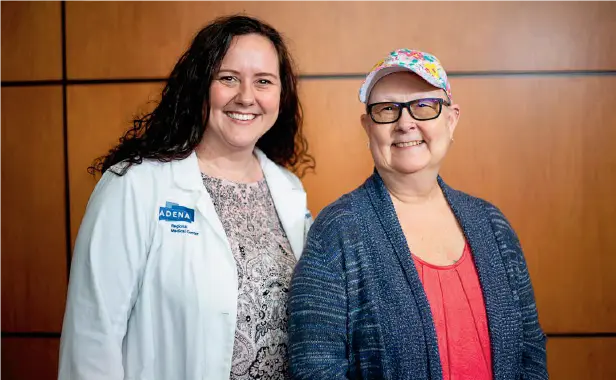A Matter of Care

 Patient/physician relationships make a difference in health care.
Patient/physician relationships make a difference in health care.
“There’s someone for everyone,” touts the old adage. That certainly applies to the patient/physician relationship.
Physicians dedicate their lives to helping others. They hold valuable knowledge about conditions, diseases, medical resources and treatments. But they, just like their patients, are human. And being human means some personalities and relationships click more naturally than others. For patients diagnosed with a potentially terminal disease, like cancer, that relationship often reaches a new level of importance.
Woman to Woman
When Penny Hutchinson describes her experience being diagnosed with and treated for breast cancer, certain words stand out: at first fearful and overwhelmed, then comforted and, ultimately, cared for.
For Hutchinson, having a positive, trusting relationship with her physician played a crucial role in her battle with breast cancer. Her initial feelings upon being diagnosed were eased during her first visit with her general surgeon, Dr. Christin Spahn of Adena Surgical.
Like Hutchinson, Spahn is a woman. This was a welcome situation for a woman about to go through one of the greatest challenges of her life.
“I haven’t seen very many female physicians in my life, but I feel so much more comfortable with a female,” Hutchinson says. “I feel that they are more in tune with what is going on in my mind and body.”
A Missed Mammogram
Hutchinson’s reason for being in Spahn’s office started much earlier. She skipped a mammogram in 2017, then in late spring of 2018 she caught a nasty virus that landed her in the doctor’s office. The physician wanted to do a CT scan of her chest.
“My primary care physician had been bugging me to schedule a mammogram,” Hutchinson recalls. “So I figured, I’ll be there anyways, might as well do the mammogram, too, and get it over with.”
A 3D mammogram discovered a lump in her breast, and on top of the anxiety of suddenly knowing she may have cancer, she was almost immediately burdened with various appointments — a surgeon, oncologist, a radiation oncologist.
“It was all very overwhelming,” she says.
Getting Started
Hutchinson wasn’t familiar with any of the surgeons she had the option of choosing, but Spahn’s compassionate style helped put her at ease during their first appointment.
Spahn acknowledges how overwhelming and scary a cancer diagnosis can be, and she takes it upon herself to be supportive and empathetic.
“For any new patient, I give everyone the time they need, which is often not just the allotted time,” Spahn says. “I sit down and explain the basics. I draw pictures. We talk about all of the potential options, the specific type of treatment for the patient — even if the patient isn't a candidate, so they understand why they weren't a candidate. These are life-altering decisions that can’t be made in the span of 10 minutes.”
It was obvious to Hutchinson she was going to be in good, caring hands.
“Once I met Dr. Spahn, I was so glad that she was going to be my surgeon,” Hutchinson says.
A Difficult Time
Hutchinson’s surgery with Spahn was scheduled to happen within a week of that first visit. Unfortunately, Spahn was unable to perform the surgery on the scheduled date because of a death in the family. Hutchinson's spirits, which had been so lifted by her interaction with Spahn, were no longer high.
“My heart sank,” recalls Hutchinson, who opted to have another surgeon do the initial lumpectomy.
When the pathology report returned, Spahn wanted to do a second surgery as a precautionary measure. Hutchinson thought this was very caring on Spahn's part, and she followed through with undergoing the second procedure.
Follow-Up
Following surgery, breast cancer patients are seen every six months for follow-up exams. The patient does not necessarily meet with her surgeon for these appointments, but Spahn offered Hutchinson the option of seeing her for the exams.
Spahn offers this to all of her patients as a way of providing convenience for routine follow-ups.
“Many times, a patient doesn’t want to see the oncologist and surgeon for the same thing,” Spahn says. “I gave Penny the option. I provide that option for all my patients. Everyone is different. I just care that the follow-up gets done.”
For Hutchinson, this was another example of Spahn’s compassionate and caring approach.
The Word on Cancer
For persons who are facing the challenge of a cancer diagnosis, Hutchinson advises: “Keep a positive attitude and remember there is always someone to talk to — and there is always hope! Don’t give up.”
While Hutchinson’s story has a happy ending, a cancer diagnosis and the events that followed would have ideally been avoided completely. She advocates that every woman get an annual mammogram. Regular mammograms don’t prevent cancer, but they do help with early detection, which increases the probability of a full recovery.
For more information on Adena Surgery, visit adena.org/surgery or to schedule an appointment with Dr. Spahn, call at 740-779-4550.